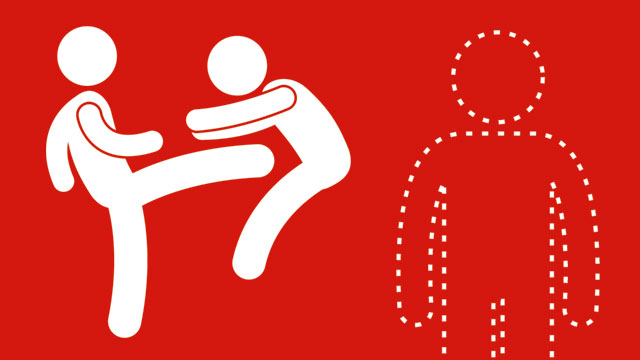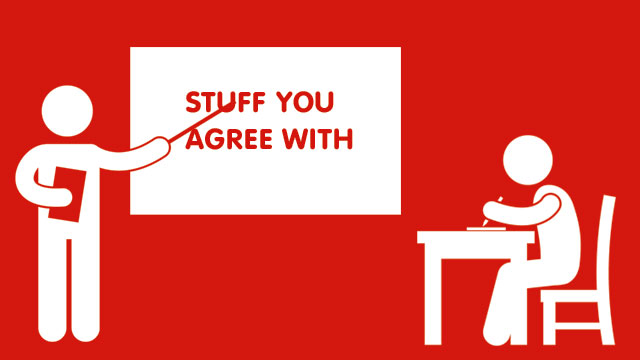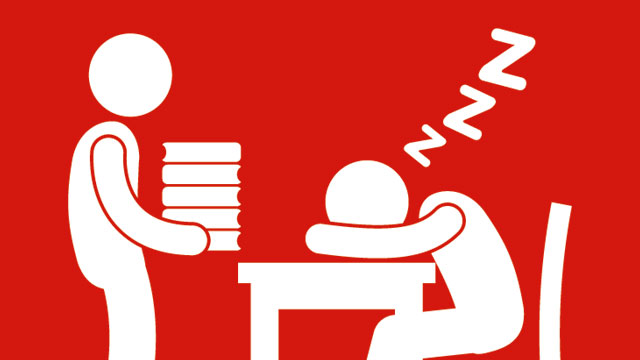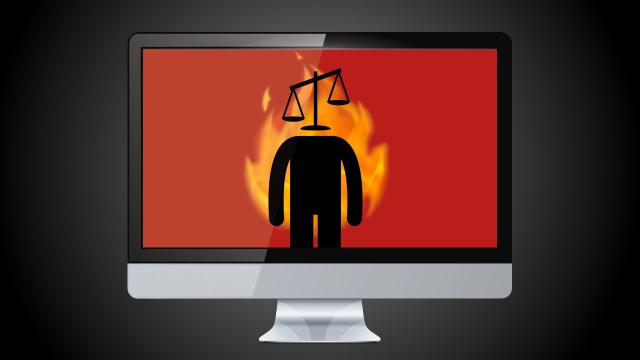Whether it’s a temporary idiot or a full-blown troll, the internet makes it easy to become any kind of jerk. This happens not just because we sit at a computer far from the people who engage us in arguments but also because of our built-in biases. The good news? If you can get a handle on the way the brain’s natural mechanics sabotage your thinking, you can avoid stupid online fights.
I can’t go forward without first stating the bad news: the people who are reading this post probably don’t need to (and those of you reading who are trolls probably aren’t going to change because of this article). Occasional jerks happen, but no one has perfect control over their emotions and occasional brain malfunctions. Haters gonna hate, and you can’t change them by learning why. Fortunately, you can use this understanding of our overactive biases to understand where the trolls and idiots get their steam. You can feel smarter for not engaging, know exactly why, and move on with your life.
The Halo Effect Confuses Your Judgment

More than anything else, the halo effect screws with the way we judge and react to information. It causes us to take irrational positions. If you find someone — yourself or anyone else — with a pointless opinion, they might suffer from the halo effect. So what is it? We’ve talked about it at length before, but here’s the gist:
The Halo effect is an attributional bias where our brain makes judgements about the character or competency of others based off of our general impression of them. In some cases, it can be viewed as a form of social proof. The problem occurs when these impressions are wrong, and since they are often based off of superficial judgements (such as if the person is attractive to us), we can be wrong quite often.
How does this affect you on the internet? If you step into a conversation on an internet forum, read an article or engage with someone on Facebook, you may take visual cues from imagery and words that colour the way you read something. Quite possibly the best example I’ve ever seen came into my inbox a little earlier this year from a reader:
Hey. I hope not to offend with this comment, but something crystallized with me just now that I have sort of reacted to several times recently. When I look at your picture with your winter hat on, you look so young to me that I feel like I can’t take you seriously. (Oddly enough, I look really young, too.) I just say that so you know and maybe other people have thought the same thing. I know it is a tiny thing, but I actually haven’t read several of your articles recently because of that. And I have never ever thought that before as I have been reading all of your stuff and appreciating it for a long time now.
Most of the time, people see you and the halo effect causes them to judge what happens afterwards. In the case of this reader, he appreciated my work first, saw my picture, but I lost credibility in his eyes when he saw how young I looked. (Ironically, I’m the oldest full-time writer on staff.) This problem doesn’t just happen with images. You can hear a person’s voice, see their choice of attire, or even hear a few trigger words that alter your mood ever so slightly. Tiny little things like this cause you to judge something differently and fail to notice your skewed opinion.
You actually can do something about the halo effect. For the answer, let’s turn to the king of solving self-delusion, David McRaney:
Periodically destroy old halos. A powerful first impression, positive or negative, creates a halo that can survive for years. Look for consistency instead. Toss out your first impressions and periodically assess everything important as if it’s the first time you’ve judged it.
He also suggests that you take notice of any time a single trait or credential increases affects you. A gruff accent can make you think negatively, and good looks can make you think positively. This happens regardless of your sexual orientation. In fact, your physical attraction can cause a variety of other problems unrelated to bias that we don’t have the time to discuss. When it comes to the halo effect, you only have to ask yourself one thing to try and beat it: why do I have this opinion? If you follow your steps back in time and find you looked at a photo, heard a voice, or felt something change before you reacted, you can take a moment and reconsider your feelings more objectively.
Confirmation Bias Makes You Accept What’s Comfortable

We like to be right, not wrong, and so we seek out information that affirms our beliefs rather than negates it. Our confirmation bias tells us to. McRaney explains this gem of self-delusion in detail:
Confirmation bias is a filter through which you see a reality that matches your expectations. It causes you to think selectively, but the real trouble begins when confirmation bias distorts your active pursuit of facts.
Punditry is a whole industry built on confirmation bias. Rush Limbaugh and Keith Olbermann, Glenn Beck and Arianna Huffington, Rachel Maddow and Ann Coulter — these people provide fuel for beliefs, they pre-filter the world to match existing worldviews. If their filter is like your filter, you love them. If it isn’t, you hate them.
You can probably guess how confirmation bias affects the way you act on the internet solely based on the example given above. If you get into a political argument, you seek out the people on your side who confirm your beliefs. Those arguing against you do the same. You throw “evidence” at each other from filtered information rather than looking at the information itself. That way, everyone can feel not just right but righteous. It does the opposite of solve a problem or create an intelligent debate, but somehow our brains love it.
The illusion of asymmetric insight makes this problem even worse. Our bias for information loves to pair up with our bias for groups. When we join a group, we mistrust those outside of it and feel a bias against them. With confirmation bias regularly in the mix, you have a double whammy.
How do you combat the problem? I had a university professor who once gave me a time-consuming but enlightening assignment: read three newspapers with vastly different viewpoints. While you may never actually get the truth that way, you’ll see the obvious biases on every side much more clearly. When you see it in others — even those on your own side — you can see it in yourself. Unfortunately, most of us don’t have the time to read three newspapers every day. We can, however, look up different perspectives on the same story (perhaps ones that aren’t as emotionally fuelled as the people we’re arguing with) and do our best to keep an open mind.
Truth Bias and Ego Depletion Prevent You From Fact-Checking

We like to believe what people tell us, even if it doesn’t always make sense. We look up to check if someone wrote gullible on the ceiling because of something called truth bias. It helps us have faith in anything we want to believe in, and we like to believe in a lot. The halo effect helps here too, because if it causes us to trust strangers we think we like due to good looks or a nice voice.
While truth bias might seem at odds with confirmation bias, they actually work well together. You can think of each like a magnet, pulling you towards positivity or negativity from somewhere approximately in the middle. Truth bias will activate your innate desire to trust weak information if you like the source, and confirmation bias will push you towards outrage if you don’t.
We need truth bias to function, but it comes with some obvious downsides as well. Dr John R. Schafer, writing for Psychology Today, explains:
This phenomenon, referred to as Truth Bias, allows society and commerce to run efficiently. Absent Truth Bias, people would spend an inordinate amount of time checking information provided by others. Truth Bias also serves as the social default. Relationships with friends and business colleagues would become strained if their veracity were constantly questioned. Faced with minor discrepancies in a story, people tend to excuse away inconsistencies because they want to believe the person who is telling the story. Truth Bias provides liars with an advantage because people want to believe what they hear, see, or read. The effect of Truth Bias is stronger if the person telling the story is a close friend, a spouse, or our children. Truth Bias diminishes when people become aware of the possibility of deception. The best defence against Truth Bias is judicious scepticism.
In many ways, laziness gets the best of us. If we have reason to distrust, we do, but we’ll choose optimism if the scale could tip either way. Like Dr Schafer notes, we need scepticism to avoid getting duped.
You can’t check every “fact”, of course, and that’s where ego depletion comes into play. It demonstrates that we have a finite amount of willpower and can burn ourselves out if we don’t use it wisely. We don’t trust solely due to laziness, but because we don’t have the energy or time to verify every statement we hear. Our brains have to execute a little equation and determine if we ought to trust what we hear. To avoid overworking ourselves, we usually get a thumbs up for most information.
Even though your brain does this for you, when you hear something you trust you should take a moment to think about it. While you can still chuck it in the truth bin, a moment of forethought gives you the opportunity to consider that what you’ve heard isn’t infallible. You can then prevent yourself from sharing this information with others online and potentially incite a flame war until you verify its veracity.
Bias causes big problems when you let it run wild, but you can avoid letting it shape your actions if you second-guess yourself often enough. Your brain causes you to think the way you think to protect you. Much of the time, you benefit from these issues. Some of the time, they cause some obnoxious problems. You can avoid them far more often, however, if you play the devil’s advocate.
Special thanks to David McRaney for his contributions to this post. You can read more of his work on his blog and by reading his books
.
Photo by Leremy (Shutterstock) Natykach Nataliia (Shutterstock), and cobalt88 (Shutterstock).

Comments
4 responses to “How Your Biased Brain Makes You A Jerk Online (And How To Stop It)”
See.. I can relate to this. I’ve been called a Troll for some of my comments when in general I was just trying to make a salient point or have been offended by a comment that may or may not have been trolling me. I actually don’t understand why trolling is necessary, if your joking around then make it understood, if your pissed off then make it understood..! I think for the most part it comes down to the perception you read into a comment. Some comments are obviously meant to sting and others just do it by accident. Now I won’t try and pass myself off as an Angel but for the most part I really do try to keep it light until it crosses a line in my head. And in my head, which is slightly OCD and very slightly Aspergers (for real) I tend to take the comments of others at face value. In other words, If someone says something that was meant as a joke but comes across as offensive I tend ‘not’ to see the joke and get pissed off. I think if we write something down that may offend accidentally you should qualify it, or use emoticons to make it obvious. I also tend to get my back up when people try to force an opinion on us all, which is why I’m so dead set against grammar trolls. Fine if you see a typo, spelling error of grammatical faux pas you may be tempted to have a go but the fact is that the person may have a genuine and important point to make only to be ridiculed for Grammar. A review by “@Luke” recently that was ripped into pieces is testimony to the pack mentality that can be raised because some one refused to see the comment for the Grammar. It’s just bloody rude, and Luke must have felt like crap because of it. I think perception is everything and I wish there was a way to qualify what was written in a way that what would normally be derived by looking at a face. Unfortunately emoticons are quite inadequate for the full experience, so were going to take things the wrong way and we’re going to get pissed off, it happen in the real world too and when it comes right down to it there are a lot of dicks out there. They just have to see if they can cause kaos just for the pure malicious hell of it and they will allays be there. In the words of the Great…. urm.. Krud.. Let’s just try and be kinder and gentler with each other… Yeah that’s not going to happen now, is it… 🙂
shut up, loser
Sorry, someone had to do it, and it had to be the first reply 😛 Anyway, I actually liked your comment, cheers for your thoughts
Dude you made me cry… then smile… 🙂